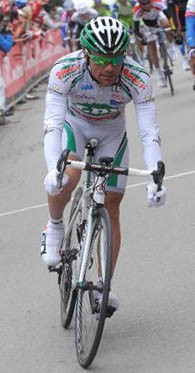Job hunt difficulties for cyclists following doping investigations and suspensions
 Three Italians – Franco Pellizotti, Danilo Di Luca and Davide Rebellin – are looking for new teams while cycling is intensifying its fight against doping.
Three Italians – Franco Pellizotti, Danilo Di Luca and Davide Rebellin – are looking for new teams while cycling is intensifying its fight against doping.
“I am in favour of increasing the duration of [doping] suspensions,” International Cycling Union (UCI) President Pat McQuaid told L’Equipe this week. “There should be a four-year ban for those who take EPO.”
Di Luca and Rebellin both tested positive for the newest blend of blood booster EPO, CERA (Continuous Erythropoietin Receptor Activator). The UCI, using its biological passport, suspected Pellizotti was doping with EPO, as well.
On May 3, the UCI announced Pellizotti had suspicious blood and urine values, and asked the Italian authorities to open an investigation. The Italian Olympic Committee (CONI) recommended he serve a two-year suspension, but the Italian anti-doping tribunal (TNA) disagreed, saying there was not sufficient evidence to prove doping.
Pellizotti is free to race, but teams are turning their back on him. They are worried the UCI will appeal the TNA’s decision to the Court of Arbitration for Sport (CAS), as it did with Tadej Valjavec. They have heard McQuaid’s opinion on team Vacansoleil hiring Riccardo Riccò, who used EPO-CERA and has returned to race.
“I’ll just say that the leaders of this team were naive,” said McQuaid. “If I am the sports director, Riccò never joins my team.”
Teams Movistar and Acqua & Sapone, according to today’s La Gazzetta dello Sport newspaper, are interested in signing Pellizotti. Movistar is a first division team, taking over the sponsorship of Caisse d’Epargne, and offers Pellizotti a chance to participate in the top races. However, team boss Eusebio Unzué must be asking himself if it is worth the headaches after already fighting a battle with the UCI to keep Alejandro Valverde.
Second division team Acqua & Sapone would be a step down for Pellizotti, second at the Giro d’Italia and winner of the mountains competition at the Tour de France in 2009. What about his former team, Liquigas? The team has decided enough is enough after six years. Plus, it has two Grand Tour champions in its stable – Ivan Basso and Vincenzo Nibali.
Di Luca is free to race after doping his way to second overall at the 2009 Giro d’Italia. He won two stages and nearly beat Denis Menchov for the overall win, but a month after the race, two anti-doping tests came back positive for EPO-CERA.
“I’ve raced professional since 1999, things have changed in cycling,” Di Luca said after his suspension ended. “I want to let the kids know that you don’t have to dope to win.”
The teams, though, have had enough of Di Luca, perhaps remembering his 2007 Giro d’Italia win with ‘angel’s urine’ and his involvement with the 2004 Oil for Drugs investigation. Team Astana considered Di Luca, according to La Gazzetta dello Sport, but, like Unzué, it can do without the headaches. The Kazakh team already had two high-profile doping cases: Alexander Vinokourov in 2007 and Alberto Contador this year.
Davide Rebellin won the silver medal at the 2008 Olympic road race thanks to EPO-CERA. The results were not known until the following year, after he won the Flèche Wallonne one-day classic in April 2009. His suspension ends in April and he has already returned the silver medal to the International Olympic Committee (IOC).
“I have several contacts, and two interesting proposals,” Rebellin, 39, told Il Giornale di Vicenza last month. “I want to return with a team that allows me to participate in the biggest races.”
Rebellin, like Pellizotti and Di Luca, will likely find that teams do not want the headaches associated with his case. The Italian trio face a blue Christmas.